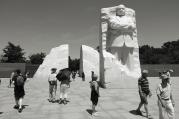Click here if you don’t see subscription options

To Be Heard
Have we, and the media in general, completely forgotten that one of the last great peace efforts by the dying Pope John Paul II was to send Cardinal Pio Laghi, the former Vatican ambassador to Washington (Signs of the Times, 11/6), to try to talk President Bush and his advisers out of their ill-advised rush to war? I am sure that today, in his deep heart’s core, our president really wishes he had heeded the pope’s voice.
Cardinal Laghi tried in vain to point out to him the difficulty of the language, the serious conflicts among Shiites, Sunnis and Kurds, and that while America’s formidable war machine would make quick work of Hussein’s inferior defenses, unmanageable human problems would certainly follow.
I have come from Rome not only to hear you, Mr. President, but also to be heard, Laghi complained at one point in their conversation. I had the impression that they had already made their decision, Laghi said in a remarkable speech in Camaldoli (Arezzo, Italy) on Oct. 4, 2003.
President Bush had been offered the best intelligence available on Iraq. The bishops in Iraq are in touch with the apostolic nuncio in Baghdad, and he with the Vatican. They speak the people’s language and have their hand on the pulse of the nation. Their knowledge of Iraq was more reliable than that of our highly paid intelligence agencies who cost us billions but whose information has been repeatedly proven embarrassingly wrong and misleading.
It was President Reagan in 1984 who urged the Senate to confirm William A. Wilson, his personal envoy to the pope, as the first U.S. ambassador to the Holy See. His reason was his oft-repeated conviction that the Vatican is the world’s greatest listening post.
I spoke at length with Cardinal Laghi last September in Rome. He recalled his sense of failure when President Bush tried to end their meeting on a positive note: at least they held common positions on the defense of human life and opposition to human cloning. The cardinal replied that those issues were not the purpose of his mission to Washington.
Larry N. Lorenzoni, S.D.B.






Ability to Respond
The deep reflections on the issue of torture in From Disciplina to the Day of Pardon, by Drew Christiansen, S.J., (10/2) are both pertinent and pressing for any Christian troubled by the present political situation in the United States. Your rejection of St. Augustine’s views on politics, however, fails to engage the full tragic character of his understanding of history. The commentaries on Augustine by Dino Bingogiart and Henry Paolucci have influenced my understanding of this issue, and I regret their voices are not available to respond to your statement.
Augustine’s political realism has been persuasive for many because it echoes the view of politics one finds in Machiavelli and Hobbes. If this view lacks any basis in reality, then it is, of course, untenable. But I think it is crucial that any reflection on the political, be it philosophical or theological, clearly states whether the view of the political found in Augustine, Machiavelli and Hobbes must be accounted for. Any political state, that view holds, must be prepared to deal with the challenge of the implacable enemy, one who rejects any way of reconciling conflicts other than violence.
The first duty of every political authority is to maintain order against the criminal within and the enemy without. The use of law, coercion and ultimately capital punishment can always be effective against the criminal. Analogous measures may also be effective against external enemies whenever shared standards of law are available. But when they are not available, Hobbes’s war of all against all becomes a prospect that must be considered, as is the jihadist who views the United States as the evil empire. The jihadist does not merit the protection of international law, since he is a transnational terrorist. The Geneva Convention applies only to citizens of nation-states that are signers to the treaty.
The use of force in the defense of one’s life is defensible by the natural law. So is the right to wage war, but with a difference. The measure of violence a state may have to use is not set by its own moral standards. The enemy determines this. This dilemma is at the heart of the political theory one finds in Augustine, Machiavelli and Hobbes. The Bush administration’s decision to apply extralegal measures against international terrorists seems, therefore, defensible.
Persuasion and good example are surely the responsibility of any Christian in conflict with an opponent. And such a Christian would be beyond judgment if he eschewed the use of force in defending his right to life. But would a state be similarly permitted to accede to another state’s lethal demands? I know no such moral law or Christian counsel that calls for this surrender. Human history, Augustine told us, is driven by two different loves, which form two very different kinds of societies. One confounds our ability to respond with justice and charity. And citizens of a nation state have the right to expect their political leaders to meet this dilemma.
George B. Pepper



Great Teaching
My freshman theology course at Manhattanville College of the Sacred Heart in 1956 was Mother Katherine Sullivan’s study of the Bible (Signs of the Times, 10/16). Thanks to her challenge, I read the entire Bible (slogging through even the doldrums of Leviticus and Deuteronomy, not to mention the disjointed though delightful Wisdom literature). But the most important influence she had was her encouragement to us to re-examine the Bible in terms of modern life and its place in our lives. How odd of God to choose the Jews was a mantra that led her classes into innumerable discussions of responsibilities that we were required to explain and take note of as they evolved with the times.
Deborah Faust
